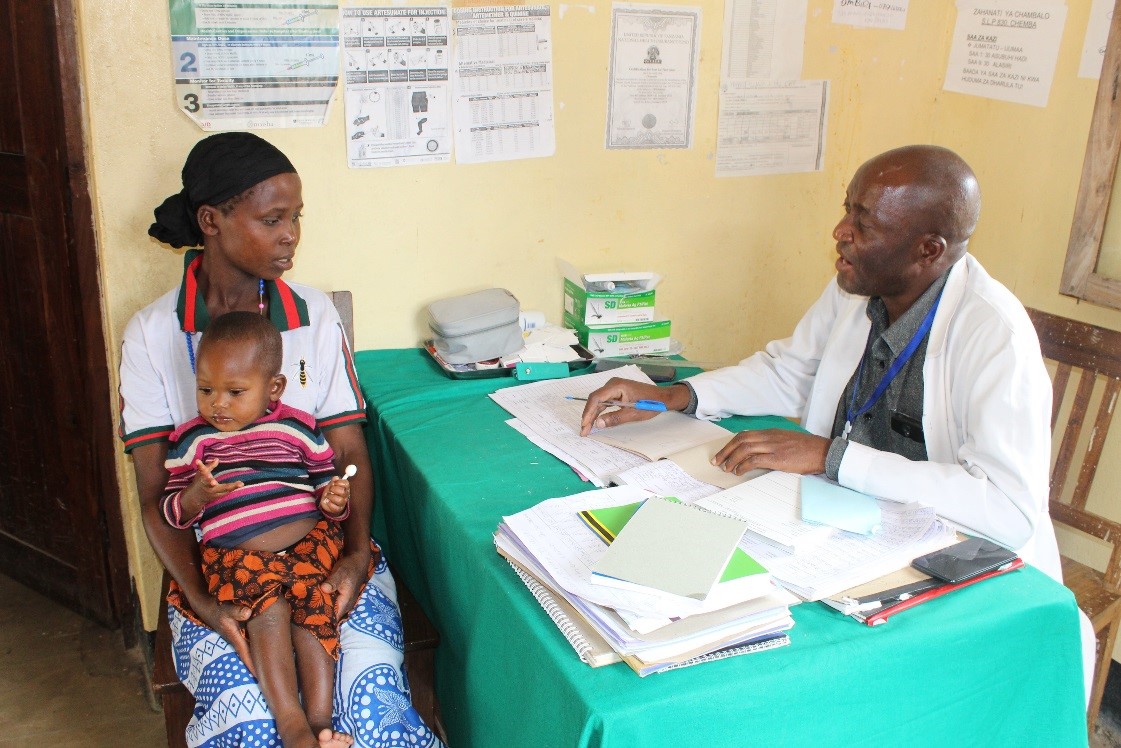Continuing His Excellency President Mkapa’s legacy through the Mkapa Fellows Programme (MFP)
News
30 July 2020
Mr. Edmond Chiwanga, a Clinical Officer at Chambalo Dispensary attending to a child.
On the week of H.E. Benjamin Mkapa’s death, Ireland joins the people of Tanzania in mourning a great leader and friend. President Mkapa played a central role in strengthening accountability institutions, transforming the public sector and incentivising growth of the private sector, and he will be remembered for his work to promote peace and democracy across the East Africa region. Even in retirement he contributed to build the primary healthcare system that will continue to change the lives of millions of Tanzanians for many years to come.
Ireland has supported the Benjamin Mkapa Foundation (BMF) since 2012 and to date Ireland has provided a total of €3.7m in funding to support to improve maternal and child health care.
Ireland first contributed to the Mkapa Fellows Programme, a 5-year initiative aimed at strengthening health systems, especially in rural underserved and hard-to-reach areas in Tanzania. Over the span of 5 years, the programme improved quality of life for people living with HIV, reduced transmission of HIV from mother to child, and reduced maternal and neonatal deaths.
Ireland continues to support Mkapa Fellows Programme now in its Phase III, which aims to improve primary healthcare services. The Benjamin Mkapa Foundation (BMF) develops innovative solutions to address human resources for health deficiencies in primary health care facilities. Ireland supports this programme to recruit, train and deploy qualified medical staff to rural and underserved areas as well as building capacity of LGAs and health facilities to improve the quality of primary healthcare services.
The Mkapa Fellows Programme has recorded significant achievements, with nearly a million people benefiting from the programme to date. Achievements include a 43% increase in pregnant women tested for HIV, a 31% increase in pregnant women on HIV treatments, and a 26% increase of women delivering at health facilities. To date, the programme has focused on reproductive, maternal, new-born and child health (RMNCH) and HIV/AIDS services in 11 selected districts of Mwanza, Dodoma, Kigoma, Simiyu, Rukwa and Shinyanga regions. This focus was in direct response to the high maternal and infant mortality rates these regions.
The COVID-19 pandemic hit Tanzania in March 2020 and stretched the health system due to the lack of human resources for health presenting huge risks for the welfare of the population. BMF was quick in its response to these challenges, adapting its 2020 programmes to the emerging need.
Ireland has prioritised national efforts to respond to COVID-19, to mitigate the impact of the pandemic on vulnerable populations. Support to the Tanzanian health system, including support and protection for frontline health workers has been key. Ireland’s grant of €500,000 to support implementation of year three of MFP Phase III, aims to contribute to the improved health and community based systems to respond to the COVID-19 outbreak, while continuing the provision of primary health care services.
Through this year’s grant, BMF has supported and deployed 90 health workers in key specialisms to support the COVID-19 response, including molecular biologists, laboratory technicians, environmental health assistants, social welfare assistants, and pharmacy technicians. In addition to facility-based staff, BMF has also recruited and deployed 500 community health workers in Simiyu, Mwanza and Dodoma.


